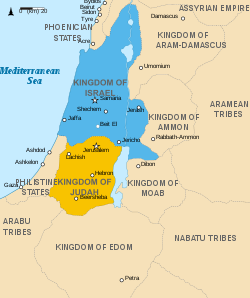House of Judah
| Kingdom of Judah | ||||||||||
|
||||||||||
|
Map of the region in the 9th century BCE
|
||||||||||
| Capital |
Hebron Jerusalem |
|||||||||
| Languages | Hebrew | |||||||||
| Religion |
Monotheistic Yahwism/Judaism Canaanite polytheism Mesopotamian polytheism Folk religion |
|||||||||
| Government | Monarchy | |||||||||
| Historical era | Levantine Iron Age | |||||||||
| • | Jeroboam's Revolt | 9th or 8th century BCE | ||||||||
| • | Siege of Jerusalem (587 BCE) | 586 BCE | ||||||||
|
||||||||||
| Today part of |
|
|||||||||
The Kingdom of Judah (Hebrew: מַמְלֶכֶת יְהוּדָה, Mamlekhet Yehudāh) was an Iron Age kingdom of the Southern Levant. The Hebrew Bible depicts it as the successor to a United Monarchy, but historians are divided about the veracity of this account. In the 10th and early 9th centuries BCE the territory of Judah appears to have been sparsely populated, limited to small rural settlements, most of them unfortified.Jerusalem, the kingdom's capital, likely did not emerge as a significant administrative centre until the end of the 8th century; prior to this archaeological evidence suggests its population was too small to sustain a viable kingdom. In the 7th century its population increased greatly, prospering under Assyrian vassalage (despite Hezekiah's revolt against the Assyrian king Sennacherib), but in 605 the Assyrian Empire was defeated, and the ensuing competition between the Twenty-sixth Dynasty of Egypt and the Neo-Babylonian Empire for control of the Eastern Mediterranean led to the destruction of the kingdom in a series of campaigns between 597 and 582, the deportation of the elite of the community, and the incorporation of Judah into a province of the Neo-Babylonian Empire.
Significant academic debate exists around the character of the Kingdom of Judah. Little archaeological evidence of an extensive, powerful Kingdom of Judah before the late 8th century BCE has been found; Nimrud Tablet K.3751, dated c. 733 BCE, is the earliest known record of the name Judah (written in Assyrian cuneiform as Yaudaya or KUR.ia-ú-da-a-a).
...
Wikipedia

